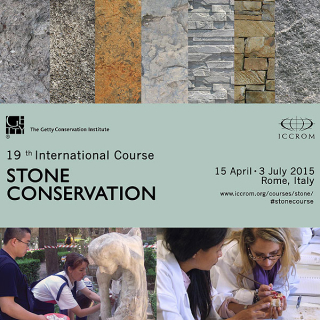Another stone course?
What’s new?
What’s different?
For the nineteenth time since 1976 a group of mid-career professionals from 20 different countries are gathering for the International Course on Stone Conservation co-organized by ICCROM in partnership with the Getty Conservation Institute. The Non-Catholic Cemetery in Rome will be hosting the field activities throughout the course and YoCoCu will provide assistance during lab exercises.
Thirty-two lecturers from universities, museums, national cultural organizations and conservation practices all over the world have been selected to offer the best possible training in the field. The ICCROM-Getty team will be running the course together for the fourth time now, with ICCROM Consultant Simon Warrack and GCI Project Specialist Benjamin Marcus acting as course coordinators.
We received over ninety applications and it is a tough job to select 20 from so many enthusiastic and competent applicants. The participants are the life blood of the course and it is they who benefit from not only the training but the shared work and life experience from all over the world. They will take this new knowledge back to their countries to share with their colleagues and students.
The course is three months, which initially seems quite long to be away but which actually flies by. Most participants find there are not enough hours in the day and not enough days in the week as they work with the course team to create a learning environment that is always full of surprises and revelations.
The programme consists of 6 modules with several hands-on laboratory sessions and demonstrations of advanced techniques (e.g. laser cleaning, portable XRF, DRMS). Creative didactic approaches will be used to stimulate the critical thinking of participants, and asking the right questions will be leitmotif of the course.
The participants will be cutting and carving stone with a sculptor, watching quarrymen in Carrara, standing in the Trevi Fountain, hanging from the scaffolding on the Rialto, walking through the Pope’s gardens, testing materials in the laboratory, restoring their own little piece of Roman heritage, slaking their own lime, mixing mortars, cleaning graffiti while learning about new cultures, tasting new foods and enjoying the life and vitality of the Roman evenings.
We are hoping for a course at least as successful as SC13, so stay tuned for more updates soon!
Member States represented: Austria, Canada, China, Colombia, Egypt, Finland, FYROM, Georgia, Italy, Japan, Malta, Mexico, Peru, Philippines, Poland, Serbia, Spain, Tanzania, Turkey, United Kingdom, Zimbabwe

